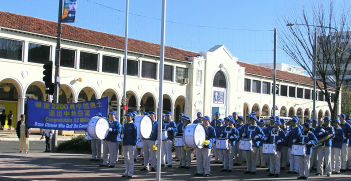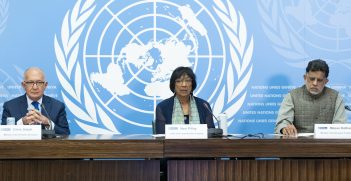What the 48th International Celebration of Sex Worker Activism Says About Status of Human Rights

The declining socio-political conditions for precarious workers around the world is one of the most salient challenges for democracies. A look at the turbulent relationship between human trafficking and sex worker advocacy highlights the urgent need to respond to human rights violations today, for a better tomorrow.
On 2 June 2023, people across the globe celebrated the 48th celebration of sex worker activism. This day commemorates the eight-day occupation at the Saint-Nizier Church in Lyon, France, by over 100 sex workers who were protesting against rampant state violence. Today, this violence against sex workers continues as they navigate poor socio-political protections and stigma. The advocacy efforts of sex workers to reduce stigma, promote decriminalisation, and establish stronger labour protections has suffered due to the conflation between human trafficking and sex work. This has spurred legislation by governments seeking to eradicate, reduce, or otherwise contain the activities of sex workers. How do states justify this equivocation?
False Entanglements Between Sex Work and Trafficking
Human trafficking is an issue affecting all countries. In 2000, the UN launched the Protocol to Prevent, Suppress and Punish Trafficking in Persons. This was a landmark adoption which provided the first internationally recognised definition of “trafficking in persons.” In the UN Office on Drugs and Crime Global Report on Trafficking in Persons 2020, it noted that “traffickers prey upon the marginalised and impoverished” and listed economic need as one of the primary methods for targeting people. The report also documented a linkage between gender and trafficking, with 70 percent of trafficked persons identifying as female. In an effort to reduce sexual violence, improve gender equity, and comply with UN protocols, many countries pursue a criminalisation model to regulate sex work. This fundamentally misunderstands both the international definition of trafficking in persons, and the definition of sex work. Whereas the former requires coercion and force, the latter requires consent.
While human trafficking presents notable danger, particularly to those experiencing extreme poverty, many governments utilise the UN’s framework to impose stricter regulations on sex workers. A recent example of this was the 2018 implementation of the Stop Enabling Sex Traffickers Act (SESTA) and the Fight Online Sex Trafficking Act (FOSTA) in the United States under the Trump administration. The purported goal of these acts was to fight human trafficking online. In reality, both acts have been linked to increases in human trafficking and violence against sex workers. SESTA/FOSTA increased state surveillance and stripped sex workers of their right to data privacy. Additionally, digital surveillance has been utilised by governments to deny people entry to the country, regardless of whether they are engaged in illegal activities or not.
Another notable example is Australia’s Modern Slavery Act (MSA), also implemented in 2018. Modern slavery is an international human security issue which threatens many industries, including services, manufacturing, agriculture, and domestic work. Yet, most countries utilise the international fight against modern slavery to further the criminalisation of sex workers. Though created with the intention to support international commitments to reducing forced labour, the MSA harms precarious workers. A 2022 report by Scarlet Alliance, an association of Australian sex worker organisations, provides a comprehensive review of the consequences of the MSA. Among its various impacts, MSA furthers the stigmatisation sex workers experience, prevents their access to safe migration pathways, and limits their access to accommodation services.
The conflation between human trafficking and sex work occurring within many countries’ regulatory frameworks not only exposes sex workers to higher levels of state violence, but it fails to address root causes identified by the UN as driving trafficking rates. This includes conditions of extreme poverty, inadequate labour protections, and strict migration laws, among others.
Human Rights Approach to Sex Work
The UN’s approach to trafficking seeks to eradicate conditions of forced labour. There is an important distinction between coercion and consent that must be acknowledged in order to achieve this goal. Until this happens, countries cannot begin to address the underlying causes which encourage people to seek precarious labour arrangements. Similarly, countries should bolster existing labour protections to prevent workers from seeking more informal arrangements.
While most countries are committed to promoting human rights, sex workers remain largely outside the scope of this framework. Sex work as a term was coined by Carol Leigh, a member of the industry who played a pivotal role in bringing awareness to the industry’s relationship to the labour rights movement. The lack of attention to underlying conditions which encourage people to engage in precarious labour is itself a form of state violence. Denying rights and enabling human trafficking are the same. The entanglement between human trafficking and sex work is dangerous, not only because it eradicates the distinction between the two, but because it assumes efforts to address trafficking will improve conditions for sex workers. Instead, sex workers and their allies have advocated for decriminalisation as necessary for labour rights and anti-trafficking initiatives.
The UN clearly articulates the need for a human rights-based approach to responding to trafficking. It specifies this approach is rooted in centering those experiencing violence, focusing on root causes, and promoting states’ legal obligation to citizens and non-citizens alike. International bodies such as the World Health Organization, Amnesty International, and the UN Programme on HIV/AIDS support decriminalising sex work as a method to end human trafficking, improve public health, and protect human rights.
As sex workers have been saying for decades: “Rights, not rescue.” The ramping up of state violence experienced by sex workers has received little attention by humanitarian interest groups. Instead, it has been sex worker-led organisations which have creatively mobilised to advocate for their rights. The passage of harmful legislation around the world has encouraged sex worker led organisations to become more active participants in legislative processes. This has resulted in material and legal changes in more democratic societies. Sex Workers Outreach Project Los Angeles (SWOPLA) members were able to work with ally organisations and California lawmakers to pass SB 357, which repealed laws criminalising loitering with intent to commit prostitution. Prior laws promoted police profiling, disproportionately affecting people of colour and transgender people.
The concerns of sex workers are not contained to a single industry or geography. What many sex workers have vocalised for years is that the issues affecting sex workers affect everyone. The ways they are treated in society indicates the broader socio-political landscape. Many workers in the industry experience other forms of marginalisation and criminalisation by virtue of the form of labour they consensually engage in. For example, many sex workers are women, migrants, queer, and/or transgender. The double stigma sex workers experience heightens the violence they experience. In countries experiencing greater repression, this can mean laws targeting any of these groups, inevitably impacting sex workers and vice versa.
Internationally, workers in all industries are continuously mobilising to have stronger labour protections, a more robust welfare system, and the ability to engage as full political citizens. Their fight represents the fight of marginalised peoples everywhere; to ensure a more democratic society means listening to and protecting sex workers.
Alisson Rowland is a PhD candidate in Political Science at the University of California, Irvine. Their research lies at the intersections of global governance and precarious labour. Stay in touch with them here.
This article is published under a Creative Commons License and may be republished with attribution.





